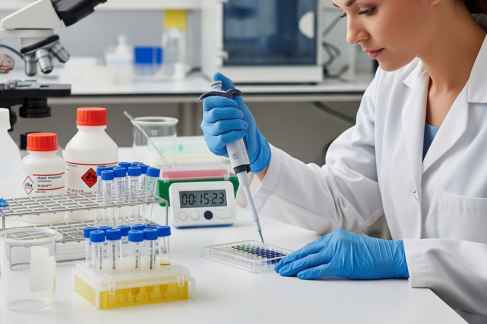Enzyme-Linked Immunosorbent Assay (ELISA) is one of the most reliable and widely used analytical techniques in both medical diagnostics and scientific research. Its popularity stems from its high sensitivity, specificity, and ability to detect small quantities of proteins, antibodies, hormones, and other biomolecules.
ELISA immunoassay kits have transformed the landscape of disease detection, vaccine development, and biological research by providing accurate, fast, and cost-effective results.
What is an ELISA Immunoassay Kit?
ELISA is a plate-based assay technique designed to detect and quantify soluble substances such as peptides, proteins, antibodies, and hormones. The principle of ELISA relies on antigen-antibody interactions. An enzyme is attached to an antibody or antigen, and upon adding a specific substrate, a measurable color change occurs.
There are four main types of ELISA techniques:
- Direct ELISA: Detects antigens using a labeled antibody.
- Indirect ELISA: Uses a secondary antibody for enhanced signal detection.
- Sandwich ELISA: Captures the target molecule between two antibodies, ensuring high specificity.
- Competitive ELISA: Measures concentration by competing binding sites between labeled and unlabeled antigens.
These variations allow ELISA to be tailored for different applications, making it a powerful and versatile laboratory tool.
ELISA in Medical Diagnostics
ELISA kits have become a cornerstone of clinical diagnostics. Their ability to detect specific antigens or antibodies makes them vital for identifying infectious diseases, autoimmune conditions, and hormonal imbalances.
1. Infectious Disease Detection
One of the most common medical uses of ELISA is in detecting infectious diseases. ELISA can identify antibodies produced by the immune system in response to infections or detect the presence of antigens from pathogens.
Common diagnostic applications include:
- HIV and Hepatitis Testing: ELISA kits are routinely used to detect HIV antibodies or Hepatitis B surface antigens, offering early and accurate diagnosis.
- COVID-19 Antibody Detection: During the pandemic, ELISA kits were used globally to detect antibodies against SARS-CoV-2, helping in surveillance and vaccine studies.
- Dengue and Malaria Detection: Specific ELISA assays help identify antibodies or antigens related to vector-borne diseases.
The high specificity and scalability of ELISA make it an ideal choice for large-scale screening programs.
2. Hormone and Endocrine Analysis
ELISA kits are extensively used in endocrinology to measure hormone levels that influence various physiological functions. They can quantify hormones like insulin, thyroid hormones, cortisol, and estrogen with remarkable precision.
These assays are valuable in:
- Diabetes Monitoring: Measuring insulin and C-peptide levels.
- Thyroid Function Tests: Detecting T3, T4, and TSH levels for thyroid disorders.
- Reproductive Health: Monitoring hormone levels like LH, FSH, and progesterone in fertility studies.
3. Autoimmune and Allergy Testing
Autoimmune diseases occur when the immune system attacks the body’s own tissues. ELISA helps identify specific autoantibodies linked to these disorders.
- Rheumatoid Arthritis: Detection of rheumatoid factors or anti-CCP antibodies.
- Systemic Lupus Erythematosus (SLE): Measurement of anti-dsDNA and anti-nuclear antibodies (ANA).
- Allergy Diagnosis: ELISA-based IgE tests detect specific allergens responsible for allergic reactions.
By identifying disease markers, ELISA contributes to early diagnosis and improved patient management.
ELISA in Research and Biotechnology
Beyond clinical settings, ELISA kits are fundamental in laboratory research and biotechnological innovation. Their quantitative accuracy enables researchers to study molecular interactions and biological pathways in depth.
1. Protein Quantification and Biomarker Discovery
In molecular biology and proteomics, ELISA is a preferred method for quantifying specific proteins in complex mixtures. Researchers use ELISA to:
- Measure cytokine levels in cell culture supernatants.
- Detect biomarkers for diseases such as cancer, cardiovascular conditions, and neurological disorders.
- Study protein expression patterns under various physiological or pathological conditions.
The high sensitivity of ELISA enables scientists to identify biomarkers even at very low concentrations, which is crucial for developing diagnostic and therapeutic targets.
2. Immunology and Vaccine Research
ELISA plays a crucial role in immunological studies and vaccine development. It is used to evaluate immune responses by measuring antibody titers in vaccinated or infected individuals.
Applications include:
- Vaccine Efficacy Testing: Measuring antibody levels post-vaccination to assess immune protection.
- Immune Response Studies: Analyzing cytokine release to understand inflammation and immunity.
- Antigen Screening: Identifying potential vaccine candidates by testing immune reactivity.
The ability to conduct high-throughput assays with ELISA accelerates research in immunotherapy and infectious disease control.
3. Drug Discovery and Pharmacology
Pharmaceutical researchers use ELISA kits for studying drug efficacy, pharmacokinetics, and toxicity. They can measure the concentration of drugs, antibodies, or metabolites in biological samples.
For example:
- Monoclonal Antibody Studies: ELISA quantifies therapeutic antibodies in serum.
- Drug Metabolism Research: Detects drug-related proteins or enzymes.
- Toxicology Screening: Identifies biomarkers linked to drug-induced side effects.
ELISA’s versatility allows researchers to monitor molecular interactions crucial for safe and effective drug design.
Advantages of Using ELISA Kits
The widespread adoption of ELISA kits in both medical and research fields is due to their numerous advantages:
- High Sensitivity and Specificity: Detects even trace amounts of analytes accurately.
- Quantitative Results: Provides measurable data for comparison and analysis.
- Scalability: Suitable for both small research labs and large diagnostic facilities.
- Ease of Automation: Compatible with microplate readers for high-throughput screening.
- Cost-Effective: Offers reliable results at a relatively low operational cost.
Conclusion
ELISA immunoassay kits have revolutionized the way diseases are diagnosed and biological processes are studied. From detecting infectious agents to measuring hormones and identifying disease biomarkers, ELISA has proven to be an indispensable tool across various scientific disciplines. Its precision, adaptability, and affordability continue to make it a preferred choice for both clinical and research laboratories worldwide.
As technology advances, newer generations of ELISA kits are becoming even more sensitive and faster, paving the way for breakthroughs in personalized medicine, immunotherapy, and molecular diagnostics.



